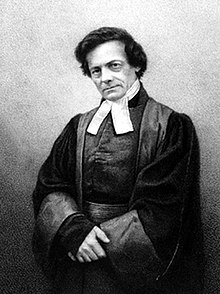Loading AI tools
French Protestant churchman From Wikipedia, the free encyclopedia
Adolphe-Louis-Frédéric-Théodore Monod (21 January 1802 – 6 April 1856) was a French Protestant churchman. His elder brother was Frédéric Monod.[1]

He was born in Copenhagen, where his father, Jean Monod (Sept. 5, 1765 – April 23, 1836; himself the eldest son of pastor Gaspard Joël Monod /1717-1782/ and his wife Suzanne Madeleine Puerari /1739-1799/),[2] was a pastor of the French Reformed church and where Jean Monod met his wife and consequently Adolph's mother, Louise-Philippine de Coninck (1775-1851). Educated at Paris and Geneva, Adolph began his life-work in 1825 as founder and pastor of a Protestant church in Naples, moving to Lyon in 1827. Here his evangelical preaching, and especially a sermon on the duties of communicants (Qui doit communier?), led to his deposition by the Catholic Minister of education and religion. Instead of leaving Lyon he began to preach in a hall and then in a chapel.[1]
On 2 September 1829 he married Hannah Honyman (1799-1868)[3] in Lyon. They had seven children,[4] including pastor André John William Honyman Monod (1834–1916), philanthropist and feminist Alexandrine Elisabeth Sarah Monod (1836–1912), Émilie Monod, Camille Monod (1843–1910).
In 1836 he took a professorship in the theological college of Montauban, removing in 1847 to Paris as preacher at the Oratoire. He died in Paris on 6 April 1856.[1][5]
Monod was considered by some the foremost Protestant preacher of 19th-century France (e.g. Guillaume Guizot (1833-1892), son of the French statesman and Protestant historian François Guizot (1787-1874)[6] referred to him in an article published in the “Journal des débats politiques et littéraires” (Journal of political and literary debates) on April 11, 1856, i.e. a few days after Adolphe Monod's funeral, as "one of the foremost Christian speakers of his time."[7] He published three volumes of sermons in 1830, another, La Crédulité de l'incrédule in 1844, and two more in 1855. Two further volumes appeared after his death.[1] One of his most influential books was the posthumous, Les Adieux d'Adolphe Monod à ses Amis et à l'Église (1857).
Seamless Wikipedia browsing. On steroids.
Every time you click a link to Wikipedia, Wiktionary or Wikiquote in your browser's search results, it will show the modern Wikiwand interface.
Wikiwand extension is a five stars, simple, with minimum permission required to keep your browsing private, safe and transparent.